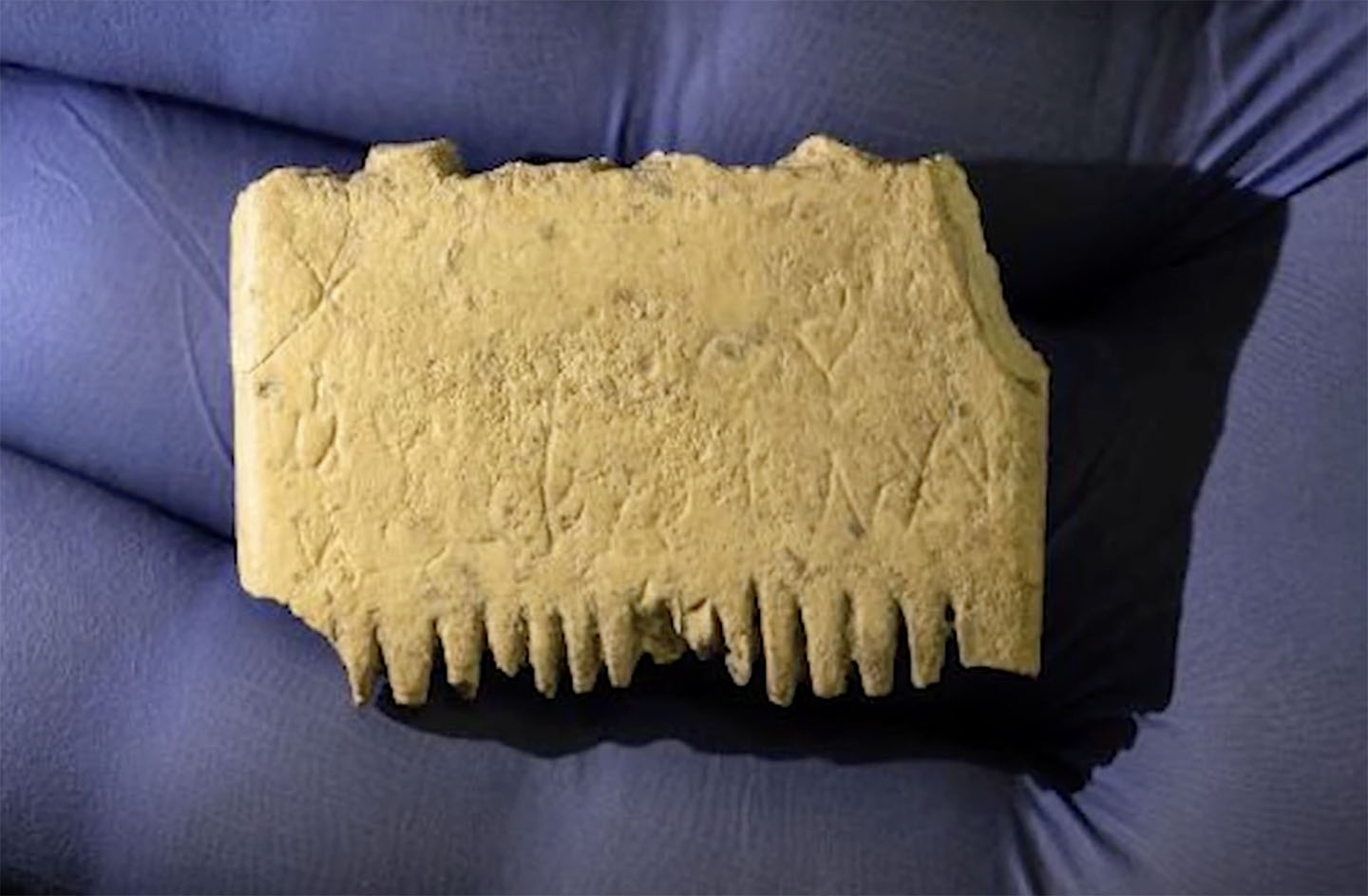 Screenshot from YouTube
Screenshot from YouTube On ivory an alphabet
was used to write, upon a comb,
by Canaanites, a tête-à-tête,
composing words found in no tome
that’s published yet, a prohibition
of lice, the third plague God inflicted.
The text is like the first edition
of this third plague, since when God sicked it
upon Egyptians, He created
a problem for which a solution
was found by Canaanites and stated
for pediculosis pollution.
Jews hint to this plague while they’re dipping
in wine their fingers, to this plague
alluding, quoting while they’re quipping
a mnemonic that is vague,
by means of an acrostic word
recalling ten plagues with ten letters,
lice being of the ten the third,
infecting all who put in fetters
the Israelites enslaved by Pharaoh.
This word for lice is on a comb
once owned by Canaanites whose hair o-
vershadows, (right?) this fun poem,
inscribed by hairy Canaanites
in maybe the first alphabet
that men used once they’d learned to write
what, if they don’t, they might forget.
Philologos (Hillel Halkin) discusses the inscription of the comb mentioned in this poem in “Was the Language Abraham Spoke Engraved on an Ancient Lice Comb?” mosaic.com, 1/4/22:
Lice, and even delousing shampoos (the oldest formula for one has been found on an Egyptian papyrus from 1,500 BCE), have been with us immemorially, and special lice combs are among the most ancient surviving artifacts of civilization. Made of wood, bone, or ivory, and sometimes intricately decorated, known examples of them date back to pre-Pharaonic Egypt. Their basic form has not changed much over time. Squarish in shape, they have traditionally had two facing sets of teeth, thicker and fewer at one end of the comb for first unknotting and straightening the hair, and finer and more numerous at the other end for removing the lice and their eggs.
In itself, therefore, there was nothing earthshaking about the discovery in 2016, in an excavation at the site of Lachish in southern Israel, of a little ivory lice comb, 3.66 by 2.51 centimeters, dated by the experts to roughly 1700 BCE—that is, to about the time that the biblical Abraham was wandering up and down Canaan. What made the Lachish comb a news item upon publication last November of an article about it in the Jerusalem Journal of Archeology was that in 2021, five years after its discovery, an investigator examining it with special optical equipment noticed the presence on it of writing. When deciphered by paleographers, this turned out to be an inscription consisting of seventeen letters (two partly illegible that had to be guessed at) in the alphabet of ancient Canaanite, the language that was the precursor of biblical Hebrew just as the Middle English of Chaucer’s time was that of the English we speak today.
Run together rather than separated into discrete words, these letters represent an extremely early example of Canaanite writing—and since it was apparently the Canaanites, influenced by Egyptian hieroglyphics, who first hit on the idea of representing each of the sounds of their language by a distinct written character, thus leading to the world’s first alphabet, from which most of the alphabets in use today are descended, our little louse comb advances knowledge of the development of one of the most important inventions in human history.
In the conclusion of the book of Malachi, Malachi 3:23-24 predicts that Elijah will come before an ‘awesome, fearful day’. He follows this with a comment that Elijah will nevertheless, just in time, unite and reconcile the generations, whose inter-enmity has presumably helped to bring about the dire situation, but he concludes his prophesy by repeating his warning, this time, however, tempered happily by his promise of reconciliation. This construct is imitated at the seder, when we too end on a happy note.
Malachi 3:23-24 states:
הִנֵּ֤ה אָנֹכִי֙ שֹׁלֵ֣חַ לָכֶ֔ם אֵ֖ת אֵלִיָּ֣ה הַנָּבִ֑יא לִפְנֵ֗י בּ֚וֹא י֣וֹם יְהֹוָ֔ה הַגָּד֖וֹל וְהַנּוֹרָֽא׃
Lo, I will send the prophet Elijah to you before the coming of the awesome, fearful day of GOD.
וְהֵשִׁ֤יב לֵב־אָבוֹת֙ עַל־בָּנִ֔ים וְלֵ֥ב בָּנִ֖ים עַל־אֲבוֹתָ֑ם פֶּן־אָב֕וֹא וְהִכֵּיתִ֥י אֶת־הָאָ֖רֶץ חֵֽרֶם׃
He shall reconcile parents with children and children with their parents, lest, when I come, I strike the whole land with utter destruction.
הִנֵּ֤ה אָנֹכִי֙ שֹׁלֵ֣חַ לָכֶ֔ם אֵ֖ת אֵלִיָּ֣ה הַנָּבִ֑יא לִפְנֵ֗י בּ֚וֹא י֣וֹם יְהֹוָ֔ה הַגָּד֖וֹל וְהַנּוֹרָֽא׃
Lo, I will send the prophet Elijah to you before the coming of the awesome, fearful day of GOD.
Gershon Hepner is a poet who has written over 25,000 poems on subjects ranging from music to literature, politics to Torah. He grew up in England and moved to Los Angeles in 1976. Using his varied interests and experiences, he has authored dozens of papers in medical and academic journals, and authored “Legal Friction: Law, Narrative, and Identity Politics in Biblical Israel.” He can be reached at gershonhepner@gmail.com.























 More news and opinions than at a Shabbat dinner, right in your inbox.
More news and opinions than at a Shabbat dinner, right in your inbox.